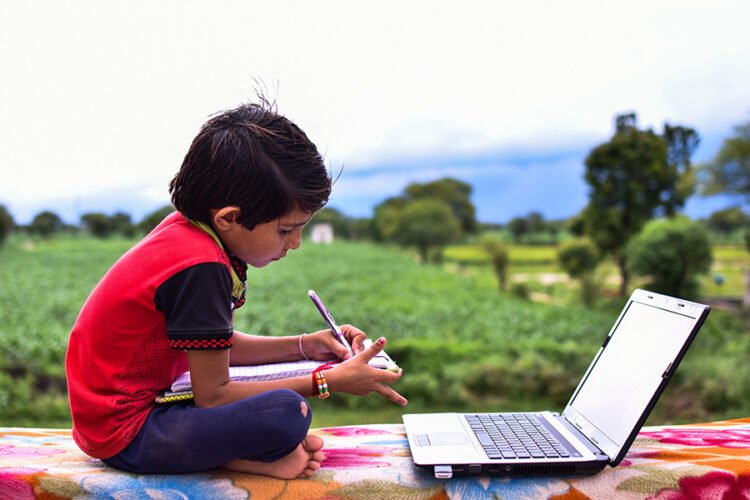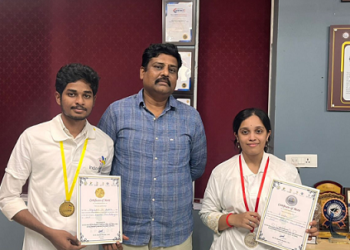Save the Children and CBGA release evidence on ‘Cost of Universalizing Early Childhood Education in India’
New Delhi: Cost of Universalising Early Childhood Education in India, a study commissioned by Save the Children India – Bal Raksha Bharat, and carried out by Centre for Budget and Governance Accountability (CBGA) was launched today, analyzing the budget to calculate the fund flow and spending on early childhood education in India. This study is the first-ever attempt to estimate the cost of universalization of ECE services in India for children in the 3–6 years age group.
The report was launched in the presence of Ms. Vrinda Sarup, former Secretary, Ministry of Education, Government of India and the keynote address was given by Prof. R Kavita Rao, Director, National Institute of Public Finance and Policy.
“The National Education Policy (NEP) 2020 confirms India’s commitment to SDG 4.2 of universalizing Early Childhood Care and Education by 2030. To achieve this goal, substantial financial investment is required. Although the NEP 2020 highlights ECCE as one of the ‘key long-term thrust areas for financing’, it needs to define the quantum of funds needed for universalization of ECCE. This report, built from our earlier work on “The Right Start” 2018 study, provides the much-needed evidence on the estimated financial resources to deliver quality ECE services to all children between the 3 – 6-year age group, and we look forward to supporting the government on evidence-based policymaking to make a lasting change in the lives of 3 – 6 year olds in India, comments Sudarshan Suchi, CEO, Save the Children, India.
Subrat Das, Executive Director, CBGA said, “Given the unevenness of quality and coverage of ECE services in the country, it is important to develop a responsive ECE model that can help the Government of India and the State Governments provide equitable services to all children aged between 3-6 years. An accurate estimate of the costs involved in providing quality early learning can aid efficient planning, enable judicious use of resources and lead to better decision-making. In this context, CBGA aimed to develop a hypothetical cost estimate for the implementation of a high-quality ECE system, based on a specified set of assumptions. This will help gauge the likely magnitude of the total resources the government will need to invest to provide quality early learning and care to children.”
Early Childhood Care and Education is an absolute necessity for a healthy and prosperous society. Providing age-appropriate care and education to young children is therefore a duty of the state. India recognises this in policy and is a signatory to a number of international agreements focused on ECCE. The National Education Policy (NEP 2020) confirms India’s commitment to the SDG 4.2 of universalising Early Childhood Education by 2030. To achieve this goal, substantial financial investment is required. While we have a sound policy landscape for ECE, it is not backed by adequate financing. The importance of ECE, however, is so lofty that it is an imperative.
Following are the key findings from the report:
The variables that constitute a well-rounded early childhood are deeply interconnected
The analyses of the three models of ECE provision, viz. NGO, government, and private entities confirm the varied structure and services of ECE programmes
The analysis in this study reveals that AWC under ICDS reports the lowest operational cost and lowest cost per child among all the selected ECE models
Public provisioning for ECE in India caters to approximately 32 percent of 3-6-years-old children and the analysis reveals that the spending is to the tune of Rs. 8,297 per child, per annum. The expenditure varies from Rs 3,792 in Meghalaya to Rs 34,758 in Arunachal Pradesh.
The average projected cost per child, per year for quality ECE services is in the range of Rs 32,531 (feasible cost) – Rs 56,327 (optimal cost). The actual cost (within this range) will depend on the type of model adopted for implementation.
The key programmatic administrative and management cost (monitoring and supervision, quality enhancement and cost for institution building) for universal ECE services per year amounts to Rs 367 crore.
The study concludes that the total budget allocation should be in the range of 1.5-2.2 per cent of GDP to provide universal quality ECE services to all children in the 3-6-year age group.
Recommendations to universalize ECE in India:
- Adequate government investment is necessary to ensure free compulsory ECE for all 3-6-year-old children
- A robust mechanism to monitor fund flow and utilization
- Conducting a sectoral analysis of ECE is the need of the hour
- Need for the availability of disaggregated physical as well as financial data at each level of governance
- Need for a professionally qualified regular-cadre workforce to ensure quality ECE
- Need to prioritise investment on training and monitoring
- There is a need to set up standardized financial norms for select components at the Central level
- Unit costs of components associated with ECE interventions need an upward revision
- Strengthening and Capacity Building of ECE institutions is required
- ECE Programmes need to be regulated
- ICT Integration in ECE programmes is essential
Public provisioning of quality ECE has the potential to act as a powerful equaliser. To successfully achieve SDG Target 4.2 within the stipulated time frame, adequate financing for quality ECCE programmes is an essential investment that India should make. The analysis in the report shows a gap in the resource requirements vis-à-vis the current allocation in the sector. Therefore, there is a need for sustainable financing strategies from alternative sources within and outside the government.
India spends 0.1% of GDP on early childhood education, Andhra highest spender
It is undeniable that to reach the required 1.5 per cent of GDP for a universal ECE programme, the first and foremost policy action that is required is a substantial increase in gross budgetary support (GBS). The report does, however, note that while an earlier draft of the NEP suggested spending 1.4 percent of total government expenditure on ECE universalization, the final report is silent on funding.
Given the limited resources of States as well as the Centre, this increase in GBS needs to be funded through a substantial increase in the country’s tax revenue. The probable long-term solutions for that are an increase in the direct tax-to-GDP14 ratio or deficit financing through debt. However, the process of resource allocation and programme implementation should start immediately.
The government expenditure in India on early childhood education (ECE) for children between the age of three years and six years is a mere 0.1% of the GDP, and the average spend per child of ₹8,297 per annum is at least a fourth of desired levels.






















